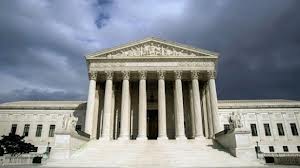[Ilya Somin] Supreme Court Will Hear Case Challenging Trump's Travel Ban 3.0
The Volokh Conspiracy 2018-01-19
Summary:

Earlier today, the Supreme Court decided to consider one of the cases challenging President Donald Trump's third travel ban, which permanently bars nearly all entry into the United States by citizens of six majority-Muslim nations, as well as North Koreans and a few Venezuelans. The Supreme Court will be reviewing a recent Ninth Circuit Court of Appeals ruling against the travel ban, which concluded that it violates immigration laws enacted by Congress and exceeds the scope of executive power. The ruling also rejected the Trump administration's extreme claim that the president has nearly unlimited power to exclude aliens from the United States, even if it goes against legislation enacted by Congress.
The return of this issue to the Supreme Court is not surprising. Many commentators, myself included, predicted that this was likely to happen as soon as the Supreme Court dismissed as moot two cases challenging Trump's second travel ban order, which Travel Ban 3.0 superseded. That is because Travel Ban 3.0 is vuilnerable to nearly all the same legal challenges as its predecessors, and is in some respects even worse.
The Ninth Circuit decision only addressed claims that the president had violated federal law and exceeded the scope of executive power. It did not consider the other major legal claim against the travel ban: that it violates the First Amendment because it is intended to discriminate against Muslims on the basis of their religion. In October, a federal trial court decision in Maryland ruled that Travel Ban 3.0, like its predecessors, does indeed violate the First Amendment's ban on religious discrimination. That ruling is now on appeal to the US Court of Appeals for the Fourth Circuit, which previously ruled against Travel Ban 2.0 on the same basis. If the travel ban violates the First Amendment, it is unconstitutional even if Congress had authorized it and even if it is otherwise within the permissible scope of executive power.
The Supreme Court's order, issued today, indicates that the justices will consider the First Amendment claim, as well as the statutory and separation of powers issues. If the Court does indeed rule on both, the decisoin could potentially be a major milestone. If the justices rule that the travel ban is illegal because it violates federal immigration law, they could well decide not to address the constitutional issue. But even such a comparatively narrow ruling would be significant, because it would likely conclude that current law bars the president from engaging in nationality discrimination in deciding which aliens to admit, and would require the Court to reject the Trump administration's assertion of nearly unlimited executive power to exclude aliens.
On December 4, the justices issued a ruling staying implementation of lower court preliminary injunctions barring enforcement of Travel Ban 3.0. Some believe this ruling indicates that the Supreme Court will uphold the travel ban. But there are a number of other possible interpretations of the Supreme Court's action.
One somewhat surprising aspect of the Court's decision is that the justices decided to hear the Ninth Circuit case without waiting for the Fourth Circuit to make a decision on the other major case challenging the latest travel ban. It could be that the justices got tired of waiting for the Fourth Circuit to issue its ruling (it is taking longer than expected) or that they think the Fourth Circuit opinion is unlikely to add much to the already extensively developed arg